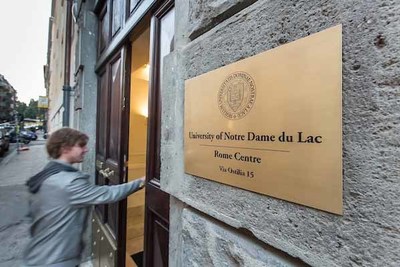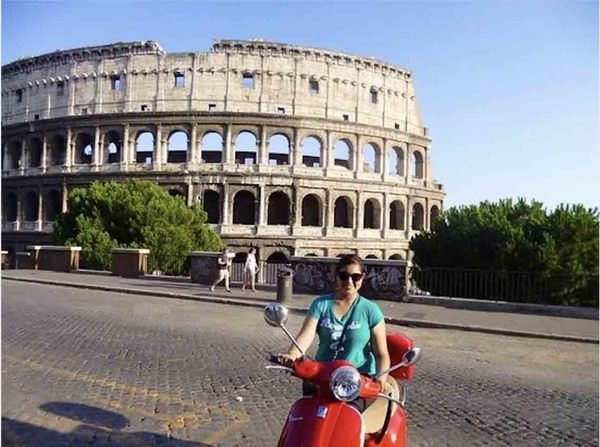Italian
Why study Italian?
Imagine… reading Dante’s Commedia in the original; being able to talk about Machiavelli and enjoy Verdi’s operas in Italian; watching Fellini and Gomorra without subtitles; consulting for an Italian engineering company; doing scientific research at CERN; working with refugees and migrants at the forefront of humanitarian action; sifting through manuscripts in the Vatican archives; or just being able to chat in Italian while sipping aperitivo on a Roman terrazza. Students in Italian at Notre Dame have done all these things. But there is no limit to your imagination and what you can do studying with us. Italian, someone wrote, is like milk and butter, spiced up with some pepper lest it cloy you with its sweetness. Where can a taste of Italian take you?
Italian language, literature, and culture is the heart of the cultural and spiritual heritage of Western civilization. As the epicenter of Christianity, Italy transfigured the classical legacy to create the fabric of Christian culture and spirituality. As the wellspring of the European Renaissance, Italy reinvented classical culture to create the modern humanistic civilization of the West. Between the seventeenth and eighteenth century, as a culmination of the Grand Tour, a visit to Italy was the pinnacle of one’s education. Since then, Italy has remained a source of learning and inspiration and a dynamic center of cultural influence and innovation.
In each of the fields of human action — from literature, art, music, architecture, theatre, and film to science, religion, philosophy, business, and politics — Italy has produced many of the greatest geniuses in history. Today, Italy is both one of the most culturally vibrant countries of Europe, and one of the most prosperous, industrialized, and technologically-advanced nations in the world.
To this day, much of the cultural vocabulary of Western civilization has its roots in Italy. To learn Italian is to become conversant in the international language of culture and to fashion oneself into a citizen of the world.
Learn more about the 94% of Italian majors who found success within 6 months of graduation.
Italian Studies at Notre Dame

Italian Studies is an area of exceptional strength at the University of Notre Dame — we even have our own facility at Notre Dame Rome.
First available as a course at Notre Dame in 1847, Italian flourished in the period between the two World Wars under the guidance of Pasquale Mario Pirchio, who established the first Italian club and Dante club at Notre Dame in the 1920s. In 1947, Paul Bosco gave new life to the program, in which he taught for 50 years with his Bolognese wife, Vittoria. Since then, Italian has grown to a teaching staff of 20 and almost 400 students per semester.
Italian is now one of the top-studied languages at Notre Dame. Great resources, outstanding faculty, and ground-breaking institutional initiatives create unparalleled opportunities for student learning and growth. To learn more about Italian at Notre Dame, visit the Center for Italian Studies website.
Programs
The Italian program offers a major, a supplementary major, a minor, and an honors track, as well as various forms of specialization in conjunction with other fields of study, such as International Economics.
The program also offers a wide range of courses for non-majors on Italian literature and culture.

Student Opportunities
Studying Italian at ND opens the door to a variety of possibilities and unique experiences.
You will have multiple opportunities to travel, study, and work in Italy:
Study in Rome in the Fall/Spring.
Become a Rome International Scholar.
Earn funding for research in Italy.
You will be part of a lively academic community: many lectures, conferences, film screenings, social events, concerts, and cultural trips centered on Italian take place each year. You can also join the student-run Italian Club. As a senior, you’ll have the opportunity to become a member of the National Italian Honor Society and to be considered for the Joseph Italo Bosco Award for Excellence in Italian Studies.
Learn More
For more information, contact Professor Kathleen Boyle Associate Director of Undergraduate Studies in Italian, or any faculty member in Italian.